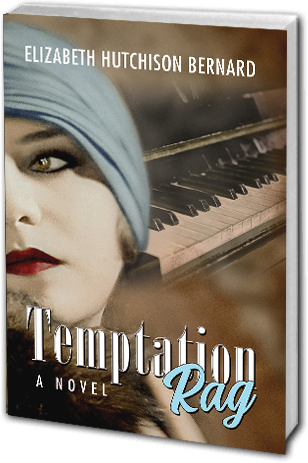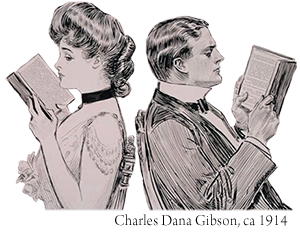The Music
“Lemon Drops”
Music written and performed by Mike Bernard
Published by Jos. Morris Co. in 1910
“Phantom Dance”
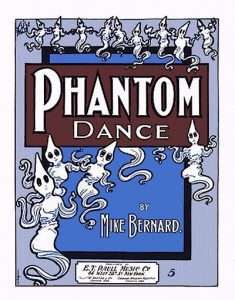
The audio files of Mike Bernard’s original song “Phantom Dance,” published in 1902, were created by Bill Gill from “scratch” by using the sheet music to enter the music notes into the Finale program. With Finale, he was able to create a clear and concise audio file in contrast to that of a 100 year old recording made with much older technology. Click here to listen. And thank you, Bill!
“The Neutrality March”
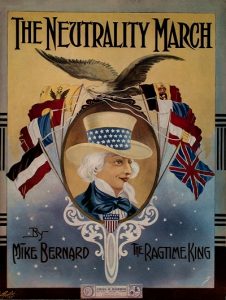
The audio files of Mike Bernard’s original song “The Neutrality March,” published in 1915, were created by Bill Gill using the Finale program. Click here to listen.
“The Battle of San Juan Hill”
Music adapted and performed by Mike Bernard
Recorded by Columbia Records in 1912
Mike Bernard had an amazing ability to recreate the sounds of battle on his piano. This song was a real crowd-pleaser! It was this kind of skill and showmanship that prompted a music reviewer for the Chicago Daily Journal, in 1910, to describe one of Bernard’s performances as “a piano-playing exhibition that looks like an acrobatic sideshow and sounds like a speeding pianola.”
“The Race Horse Rag”
Music written and performed by Mike Bernard
Published by Jos. Morris Co. in 1911
“The Stinging Bee”
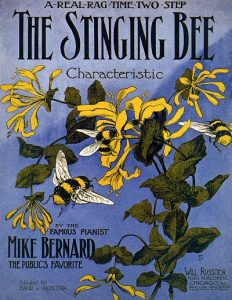
The audio files of Mike Bernard’s original song “The Stinging Bee,” published in 1908, were created by Bill Gill using the Finale program. Click here to listen.
“That Ticklin’ Rag”
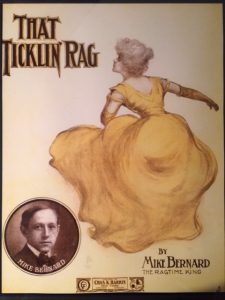
The audio files of Mike Bernard’s original song “That Ticklin’ Rag,” published in 1910, were created by Bill Gill using the Finale program. Click here to listen.
Overture to In Dahomey
Music by Will Marion Cook
Will Marion Cook was an African American violinist, conductor, and composer of the ragtime era in New York City. Classically trained, Cook studied at the Oberlin Conservatory of Music, the Berlin Hochschule für Musik in Germany, and with the famous Bohemian composer Antonin Dvorák. Cook was among the group of African American composers who felt it was important to maintain the authenticity of Negro music rooted in slave spirituals. His most acclaimed musical theater productions include Clorindy, or the Origin of the Cakewalk (1898); Jes Lak White Fo’ks (1899); and In Dahomey(1903). The African American musicians known as the Clef Club Orchestra, organized by James Reese Europe and frequently conducted by Will Marion Cook, earned the distinction of playing their unique style of syncopated music including many of Cook’s compositions at a Carnegie Hall concert in 1912. Will Marion Cook is among the real-life characters inhabiting the pages of Temptation Rag: A Novel.
“Lift Every Voice and Sing”
Music by J. Rosamond Johnson
African American composer and performer J. Rosamond Johnson, an important character in the fictionalized story of Temptation Rag, wrote the music to “Lift Every Voice and Sing.” His brother, the poet James Weldon Johnson, wrote the lyrics. The song was first performed in 1900 and later was widely regarded as the African American “National Anthem.” The recording here is a modern, acapella version of the traditional hymn, performed by the group Committed. (Note: The correct spelling of the composer’s name is “Rosamond.”)
“Under the Bamboo Tree”
Music and Lyrics by J. Rosamond Johnson and Bob Cole
This song was a huge hit in the early 1900s and beyond. By today’s standards, the lyrics (though written by Johnson and Cole, both African American) would be offensive to many; the song is included here for its historical importance. First introduced in vaudeville, it was featured in the Broadway musical “Sally in Our Alley” in 1902 and sung by Marie Cahill. It remained part of her repertoire for years. The sheet music sold more than 400,000 copies. This old recording, also from 1902, features singer Arthur Collins.
“Mister Johnson, Turn Me Loose”
Music and Lyrics by Ben Harney
Published by M. Whitmark & Sons in 1896
Ben Harney has been called the “Father of Ragtime.” As the fictionalized story of Temptation Rag explores, however, such a title is misleading since ragtime originated in the African American community. Harney, who popularized ragtime music among white audiences, was at one time the highest-paid entertainer in vaudeville. This recording of his 1896 song “Mr. Johnson, Turn Me Loose” is not an original; Harney is not playing it, but the sound quality is vastly superior to other available recordings.
“You’ve Been a Good Old Wagon but You Done Broke Down”
Music and Lyrics by Ben Harney
Published 1895
Ben Harney’s “Good Old Wagon” is thought to be the first published ragtime song. Take a listen to this unaccompanied version of him singing it. I think of him kind of like the Bob Dylan of the ragtime era! (Note: The name Ben Harvey, at the start of this video, is the producer’s blooper. It is, of course, Ben Harney.)
“Summertime”
Music from George Gershwin’s Porgy and Bess
Recording of soprano Abbie Mitchell from 1938
Abbie Mitchell was a brilliant soprano who, at a very young age, married African American composer Will Marion Cook and became an influential musical figure in her own right. Over the course of a long career, Abbie Mitchell starred in numerous musical theater productions in America as well as performing in Europe at the invitation of English and Russian royalty. In Temptation Rag, Abbie and the story’s female lead, May Convery, form a close friendship which, while entirely invented, serves to introduce readers to this iconic figure in African American musical history. This recording is from 1938, well after the major action of Temptation Rag: A Novel takes place, but it is the best example of Abbie Mitchell’s astonishing vocal abilities.
